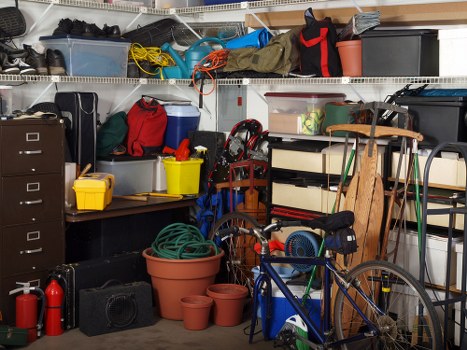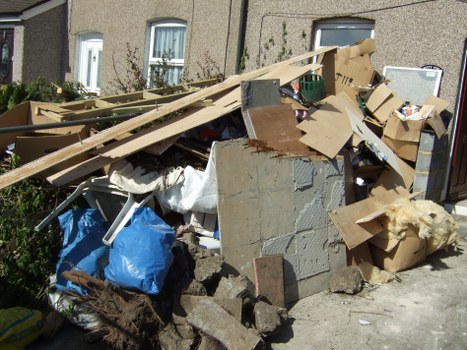Council Large Item Collection in Clearance Rubbish London
Understanding Council Large Item Collection Services

The Council Large Item Collection service in London is designed to assist residents in disposing of bulky and large items that cannot be handled through regular waste collection. Whether you're renovating your home, clearing out old furniture, or dealing with large amounts of rubbish, this service provides an efficient and environmentally friendly solution.
Many London households accumulate large items over time, such as old appliances, mattresses, furniture, and electronic waste. Proper disposal of these items is crucial not only for maintaining a clean living environment but also for adhering to local regulations regarding waste management.
The Clearance Rubbish London service ensures that these items are collected responsibly, minimizing the impact on the environment and promoting recycling and reuse where possible.
Eligibility and Scheduling Your Collection

To take advantage of the Large Item Collection service, residents must meet certain eligibility criteria set by their local council. Typically, this service is available to homeowners, tenants, and certain types of businesses within specified areas of London.
Scheduling a collection involves contacting the local council's waste management department, either through their website or by phone. It's important to book in advance, as slots can fill up quickly, especially during peak times such as spring cleanings or post-holiday periods.
When scheduling, be prepared to provide details about the items you need collected, including the type, number, and approximate size or weight. This information helps the council allocate the appropriate resources for your collection.
Types of Items Accepted

The Clearance Rubbish service covers a wide range of large items. Commonly accepted items include:
- Old furniture (sofas, beds, tables)
- Appliances (refrigerators, washing machines, ovens)
- Mattresses and box springs
- Large electronics (televisions, computers)
- Bulky waste materials (construction debris, garden waste)
It's important to note that hazardous materials, such as asbestos, certain chemicals, and electronic waste containing harmful substances, may require special handling and should not be disposed of through the standard bulk collection service.
For items not listed as accepted, residents should consult their council's guidelines or contact waste management authorities for alternative disposal methods.
Preparation for Collection

Proper preparation ensures a smooth and efficient collection process. Here are some key steps to follow:
- Sort Your Items: Separate items that are suitable for donation or recycling from those that need to be discarded.
- Secure the Items: Place large items in a designated area, ensuring they are easily accessible for the collection team.
- Label Hazardous Waste: Clearly mark any items that require special handling to prevent contamination of other rubbish.
- Measure Access Points: Ensure that collection vehicles can reach the items without obstruction, considering doorways, driveways, and stairways.
- Follow Local Guidelines: Adhere to any specific instructions provided by your council regarding the placement and arrangement of items.
By following these preparation steps, residents can help facilitate an efficient collection process and avoid potential delays or additional fees.
Environmental Impact and Recycling

One of the primary goals of the Clearance Rubbish London service is to reduce the environmental impact of waste. By properly disposing of large items, the council ensures that materials are processed in an environmentally responsible manner.
Recycling plays a significant role in this process. Items like metal appliances, electronic devices, and certain plastics can be recycled and repurposed, reducing the need for new raw materials and minimizing landfill usage.
Additionally, the service promotes the reuse of items where possible. Furniture and appliances that are still in good condition may be donated to charities or organizations that can extend their lifecycle, benefiting both the community and the environment.
Costs and Fees
While many Large Item Collection services are free for eligible residents, some councils may charge a fee for certain types of waste or for additional collections beyond the standard allotment. It's essential to check with your local authority to understand any potential costs involved.
Fees, if applicable, are typically structured to cover the costs of collection, transportation, and processing of waste. Some councils offer discounts or exemptions for specific groups, such as low-income households or those with disabilities.
Understanding the cost structure helps residents plan their waste disposal needs effectively and ensures transparency in the services provided.
Benefits of Using Council Collection Services
There are numerous advantages to utilizing the Council Large Item Collection service:
- Convenience: Scheduled collections save time and effort compared to arranging private waste removal.
- Environmental Responsibility: Proper disposal and recycling minimize environmental impact.
- Cost-Effective: Many services are offered free of charge, reducing the financial burden on residents.
- Regulatory Compliance: Ensures adherence to local waste management laws and guidelines.
- Community Support: Enhances community well-being by maintaining clean and orderly neighborhoods.
By taking advantage of these services, residents contribute to a more sustainable and organized urban environment.
Alternative Disposal Options
In cases where the council's bulk collection service does not meet specific needs, residents have alternative disposal options:
- Private Waste Removal Services: Companies offer tailored services for large item disposal, often with quicker turnaround times.
- Recycling Centres: Local recycling facilities accept various types of bulk waste for proper processing.
- Charity Donations: Items in good condition can be donated to charitable organizations, promoting reuse and aiding those in need.
- Sell or Give Away: Platforms like online marketplaces or community boards allow residents to sell or give away items they no longer need.
Exploring these alternatives ensures that all large items are disposed of responsibly, aligning with personal and environmental goals.
Common Challenges and Solutions
While the Council Large Item Collection service is highly beneficial, residents may encounter certain challenges:
- Scheduling Delays: High demand can lead to delays in collection slots.
- Item Restrictions: Not all large items are accepted, requiring alternative disposal methods.
- Accessibility Issues: Limited access to certain areas may complicate the collection process.
To mitigate these challenges:
- Plan Ahead: Schedule collections well in advance, especially during peak periods.
- Verify Item Eligibility: Check council guidelines to ensure items qualify for bulk collection.
- Prepare Access: Ensure clear pathways for collection vehicles to efficiently retrieve items.
Proactive planning and adherence to guidelines help overcome common obstacles and ensure a seamless waste collection experience.
Tips for Efficient Bulk Waste Management
Effective management of bulk waste involves strategic planning and organization. Here are some tips to enhance your experience with the Large Item Collection service:
- Create a List: Enumerate all large items that need disposal to streamline the collection process.
- Sort Items: Differentiate between items for recycling, donation, and disposal to ensure proper handling.
- Measure Space: Assess the area where items will be placed for collection to avoid obstructions.
- Follow Guidelines: Adhere to local council regulations regarding bulk waste disposal.
- Stay Informed: Keep up-to-date with any changes in the council's waste collection policies or schedules.
Implementing these strategies promotes efficient waste management and maximizes the benefits of the council's collection services.
Community Impact and Sustainability
The Clearance Rubbish London service plays a pivotal role in fostering community well-being and sustainability:
- Reducing Landfill Use: Efficient bulk waste collection minimizes the strain on landfills, promoting a cleaner environment.
- Promoting Recycling: By enabling the recycling of materials, the service supports the development of a circular economy.
- Enhancing Aesthetics: Proper waste disposal enhances the visual appeal of neighborhoods, contributing to overall community pride.
- Supporting Local Charities: Donations of reusable items assist charitable organizations in their missions.
Collectively, these impacts contribute to a more sustainable and harmonious urban landscape, aligning with broader environmental and social goals.
Future Developments in Waste Collection
As environmental awareness grows, councils are continually evolving their waste collection services to meet emerging needs:
- Increased Recycling Initiatives: Expanding the range of recyclable materials and improving processing technologies.
- Smart Waste Management: Implementing technology to optimize collection routes and schedules.
- Community Education: Enhancing public knowledge about waste reduction and proper disposal practices.
- Green Partnerships: Collaborating with environmental organizations to promote sustainable waste management.
Staying informed about these developments enables residents to participate actively in sustainable practices and benefit from enhanced waste collection services.
How to Get Started with Your Large Item Collection
Embarking on your Council Large Item Collection journey is straightforward:
- Check Eligibility: Visit your local council's website to understand the criteria for bulk waste collection.
- List Your Items: Make a detailed list of the large items you intend to dispose of.
- Schedule a Collection: Contact the council to book a suitable collection slot.
- Prepare Your Items: Follow the preparation guidelines to ensure a smooth collection process.
- Await Collection: Ensure all items are ready and accessible on the scheduled day.
By following these steps, you can efficiently manage the disposal of bulky items, contributing to a cleaner and more organized living space.
FAQs About Large Item Collection
Addressing common questions can help clarify the specifics of the service:
What qualifies as a large item?
Large items typically include furniture, appliances, mattresses, and other bulky waste that cannot be handled through regular rubbish collection.
Is there a limit to the number of items I can collect?
While many councils offer a set number of bulk collections per year, additional collections may be available for a fee. It's best to consult your local council for specific limits.
Are there items that cannot be collected?
Yes, hazardous materials, certain electronic waste, and items containing harmful substances usually cannot be collected through standard bulk waste services.
Conclusion
The Council Large Item Collection in Clearance Rubbish London offers a vital service for residents looking to dispose of bulky items responsibly and efficiently. By understanding the eligibility criteria, preparing items correctly, and utilizing the service effectively, Londoners can maintain clean and sustainable living environments.
Don't let bulky waste overwhelm your space. Contact your local council today to schedule a large item collection and contribute to a greener, cleaner London.
Book your service now and take the first step towards effective waste management and environmental stewardship.